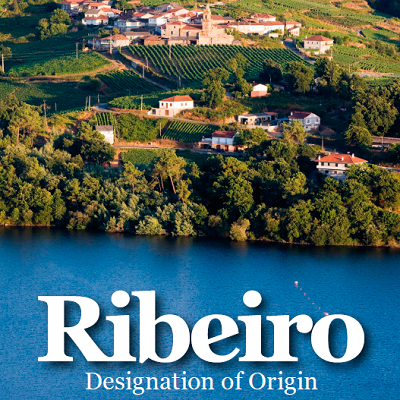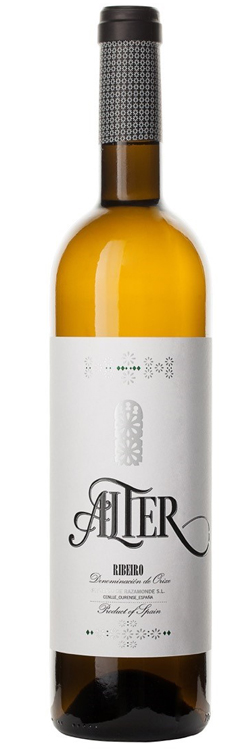When I’m not buying wines for wine courses, I find myself buying wines with lower acidity. Ribeiro whites ticked that box, at a recent wine tasting.
Ribeiro D.O. is in Spain’s Galicia region, in the north-west of the country, on the Portuguese border, some 30km from the Atlantic. Its tradition of vine-growing dates back at least as far as the C12th, when Cistercian monks replanted the vineyards.
Ribeiro has both maritime and continental influences, being protected the west and north by mountains. Rain is plentiful (as you might expect), at 950mm, and the area gets 1,915 hours of sunshine. Although soils are mixed, producers appear to praise its decomposed granite soil (sábrego), which is said to give “valuable minerality.”

Grape growing is centred around three valleys – the Mino, Avia and Arnoia, with many vineyards located on terraced slopes. The Mino valley lies closest to the coast, and has the greatest concentration of wineries. It also has the lowest altitude, and more clay than granite. The Avia valley, further inland, has more continental influence, with greater seasonal temperature swings. It has alluvial soils, with a lot of sandy and granitic influences. The Arnoia Valley has two zones – warmer to the north, with diverse soils and small farms. The southern part is cool, due to higher altitude.
The DO is quite small, similar in size to Rias Baixas, at 2,500ha. 90% of production is white. Grape growing and winemaking is extremely diverse, as small-scale farming is the norm (there are some 5,700 growers registered). The DO accords special recognition in a way to its smaller producers, or ‘Colleitero’ (harvesters) which have less than 60,000l production, made from their own grapes.
Treixadura is their speciality grape, which accounts for 70% of all plantings. It’s genetically close to Arinto, and also a parent of Loureiro, reflecting its proximity to the Portuguese border. Treixadura has subtle notes of green fruit (pears, apple) and white flowers, and often a slight creamy texture. It is often lees-aged and rarely oaked. In terms of acidity, it is naturally low. Some producers allow malo-lactic fermentation, which further softens the acidity.
From a grower’s point of view, Treixadura is slow to bud and ripen. It has thick skin (which mitigates fungal disease). It has a tendency to be vigorous (between 12-15 tonnes/ha). It is susceptible to oidium, mildew, Botrytis cinerea and excoriose.
Treixadura is mostly blended with Albariňo, Godello and Loureiro, although single varietal wines are also made.
While some Ribeiro whites are expensive, I was struck by the affordability of some of these wines. Verbos Inventados is one such.
Many thanks to the organisers, the Spanish Wine Tasters’ Association. Part of their remit is wine education (they were awarded the Best Wine Education Centre in Spain), and they also organise Spanish wine competitions. Thanks also to Julie Dupouy, who hosted the tasting superbly.

Ribeiro wines in Ireland right now are hard to find. There are 115 wineries, but only 15% is exported. However, with the spate of recent investment, coupled with initiatives like this tasting, we might expect to see more in future. Glug Wines has the fabulous Gomariz X below. Liberty Wines is introducing wines from Alter, a family-owned winery with 24ha, founded as recently as 2014. Ramon do Casar is also available.
Wines marked * from this list are available in Ireland. All wines tasted were 2018 vintage, and all were Treixadura blends, except where stated otherwise:
Verbos Inventados from Adegas Terraeis very creamy, buttery, minerally/salty, with pithy citrus and super length. Excellent price/quality ratio.
Vina Costeira is a very good entry level wine, with crisp acidity, that lovely Treixadura mouthfeel, with peach, nectarine, crisp Rocha pear and dried apple, and crisp acidity.
O Cotarelo Blanco (again, entry level pricing) from Adega o Cotarela has a vague salty hint, quite rich flavours of pear with a fuzzy peach skin note.
Gomariz X* from Coto de Gomariz is honeyed, and super ripe tasting (13.5% abv) reminiscent of biscuit peach tart concentrated, and rich tasting, with low acidity. It’s 95% Albariňo and 5% Treixadura.
Ramon do Casar* has orange pitch, orange blossom and peach notes, with a slight saltliness, creamy, and with a very long finish.
Monica Albor is very pale coloured, with a very salty aroma, and a clean, linear style with crisp acidity, lemony flavours and rich and lively mouthfeel.
Mauro Estevez is a premium, almost Burgundian-style wine, full-bodied and full-flavoured with a rich, warm mouthfeel (13% abv), ripe Golden Delicious apple, spice, pastry and biscuit.
